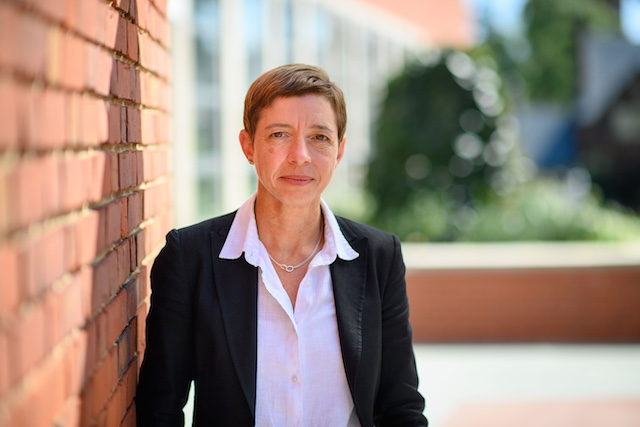
When Layna Mosley visited Rollins as a prospective student, the campus was bizarrely empty. The admissions team informed her it was “Fox Day,” and Mosley was charmed. She committed that day and graduated from Rollins College in 1993.
32 years later, Layna Mosley was back on campus to speak on the future of global finance and the waning power of the U.S. dollar—her Rollins thesis advisor, Tom Lairson, as well as her brother and daughter, were watching from the front row of the Crummer Auditorium.
Mosley was the first in her family to attend college. Now, she is on a mission to address global inequalities. Mosley hosted the 6th Interdisciplinary Sovereign Debt Research and Management Conference (DebtCon6) at Princeton University in 2023, with the seventh meeting being held in Paris and the eighth coming up in October 2025 in Washington D.C. From 2017 to 2022, Mosley was on the executive board for the Women Also Know Stuff initiative, an organization that helps journalists seek out female experts in political science, as male researchers are disproportionately featured in the media. To get a taste of the Princeton politics courses, you can glimpse the syllabus and readings for her Political Risk Analysis course.
At Rollins, Mosley majored in International Relations, ran cross country, and had the same roommate from the golf team all four years. She went on to earn a Ph.D. at Duke University and is now at Princeton University as a professor of politics and the International Affairs Associate Chair in the Department of Politics.
With all the free time she doesn’t have, Mosley plays one-on-one basketball with her 11-year-old, rows on Carnegie Lake in Princeton, and runs ultra marathons. “I did some 100 milers too,” she said.
It is objectively a difficult time to be working in higher education—right now, Mosley’s school is being severely threatened—Trump is waging a war on higher education, including Princeton University.
“There is a lot of concern about the hostility of the current administration towards higher education…this is the slow erosion of the freedom of institutions to do what we want to do,” said Mosley.
“And the endowment does all kinds of good. But of course, it’s not clear that the Republicans in Congress right now would say ‘oh but you’re doing good with your endowment by using it for admitting people who don’t have opportunities.’” This stems from the fact that Princeton offers free tuition to students who come from families that make under $100,000 a year.
On April 1, Trump moved to suspend dozens of federal grants to the Ivy League school, not long after stripping away $400 million in grants to Columbia University. The reasoning is inconsistent; some schools have been accused of endemic antisemitism for allowing students to protest despite support from Jewish professors, while U Penn was punished in the form of suspending $175 million for allowing a transgender woman to compete for their women’s swim team in 2022.
Harvard University has already had $2.3 billion frozen in federal funds; Trump threatened to strip it of $9 billion in subsidies as well as remove its tax-exempt status if the school did not comply with the administration’s “intellectual conditions,” like removing diversity programs, toughening disciplinary action against students, and an “audit” of the student body.
The president of Princeton University, Christopher L. Eisgruber, was one of the first to take a stand against the administration, decrying Trump’s attack on Columbia University in The Atlantic back in March. Harvard just recently stood up to Trump: “No government—regardless of which party is in power—should dictate what private universities can teach, whom they can admit and hire, and which areas of study and inquiry they can pursue,” said the president, Alan M. Garber.
Mosley said that amidst her circle of political scientists at Princeton, “The nervousness is about the endowment, but it is also really about U.S. democracy and institutional erosion.”
The global order is shifting, as freedom has been declining for over 16 years, and we seem to be living in an era of expanded authoritarian rule, according to Freedom House. But Mosley says, “what they are doing—mobilizing what is often economic discontent in a way that targets elites, targets the global system, and targets immigrants—is not new. And are far-right parties inspired by the success of far-right parties elsewhere? Absolutely. Many of the things that Trump is doing right now looks like Hungary’s Victor Orban. Orban goes after the universities.”
Mosley published a paper with the Brookings Institution on “The Financial and Economic Dangers of Democratic Backsliding,” and she shared that when economic concerns and cultural concerns or racist attitudes collide, populists can thrive.
“There has been this big shift in the U.S. where Republicans used to be the party of free trade. That has completely flipped around, and what is so interesting is that the Republicans were willing to follow Trump on this pivot in 2016.”
What many scholars grapple with is explaining why.
“There is an argument that economic anxiety and economic downturns can activate some of these anti-foreigner and anti-immigrant sentiments,” said Mosley. “I think he was using NAFTA as short-hand for ‘Mexico and immigrants from Mexico,’ even though NAFTA doesn’t cover immigration at all,” she said of Trump’s disdain for the North American Free Trade Agreement, which created a free-trade zone in North America for Mexico, Canada, and the U.S. in 1992.
The same goes for our trade policies with China, says Mosley. “The way that tariffs get justified is by saying ‘other countries aren’t playing fairly,’ even though that may not necessarily be true.”
She adds, “It’s an interesting rhetoric because it allows for this argument that international institutions are bad and somehow biased against the U.S…. and also that other countries are not reliable partners, which is ironic because it’s the U.S. that is not being a reliable partner.”
“Trump and his allies have been effective at this as a messaging strategy. It’s bad policy, but it’s also eternally consistent.”
She says this amidst rising gas prices and an inflation rate that has risen since November; basic economics teaches that prices are “sticky” and rise more quickly than they fall, so high prices are here to stay even if tariffs come down.
In April, U.S. Senator Brian Schatz (D-Hawaii) stated right before the new tariff plan took effect that Trump is “ruining the economy on purpose… Starting tomorrow, we’ll be paying more for everything—groceries, food, cars, homes, toys, electronics, everything that you buy…Trillions of dollars of wealth are being demolished. These are everyday people panicked about how much more expensive their next trip to Walmart or Costco will be or when they’ll lose their job.”
Mosley’s research is not focused directly on the United States, despite her encompassing knowledge on the subject. She zeroes in on how developing countries borrow money, how their governments make decisions on where to borrow, and how their political environment affects whether investors see them as risky or not, which in turn affects how expensive it is to borrow money.
This is where the U.S. comes into play. “The U.S. is so important in global financial markets. If interest rates are low in the U.S., it’s cheaper for every country worldwide to get money. U.S. financial events get transmitted to the rest of the world, so developing countries have less sovereignty when they are hit by these external shocks that are not of their own making,” she said.
Although she does not work directly in government, Mosley is on a panel of experts to advise the International Monetary Fund how to better help countries deal with debt issues.
“I’m not making policy, but I feel like I get to have some influence based on my research and my colleagues’ research on how things work in politics,” she said.
Amidst Trump’s anti-DEI crackdowns on over 50 universities, a private liberal arts school like Rollins is certainly not safe from the fire. As investigative journalist Russ Baker said, “The current standoff at Harvard Yard harkens back to a long-playing project of more traditional conservative Republican elements: weakening all institutions perceived, rightly or wrongly, as pillars of the Left, the Democratic Party, those who challenge tradition—and the primacy of both the American white male and the One Percent.” He believes the anti-science, anti-independent institutions, anti-rule of law tirade threatens the liberal arts directly because it deplores the teaching of common values and goals, collective action, and virtues of empathy, compassion, and collaboration.
Rollins sits in uncertainty with these attacks on higher education, as international students fear that their visas will be revoked after Trump’s State Department has changed the status of over 1,500 students already. President Cornwell has been an outspoken advocate for the freedom of higher education, writing op-eds back in 2018 and in 2023 amidst Governor Ron Desantis’ attacks on higher ed.
In a recent letter to the school, Cornwell shared that he is collaborating with incoming president Brooke Barnett to assess where Rollins stands and is refreshing the work of the school around a theme of “Thriving Together,” where Rollins embraces the free exchange of ideas and diverse perspectives and “where all individuals have the opportunity to achieve, grow, gain knowledge, and flourish.”
One of the things Mosley loved the most about her Rollins education was how interdisciplinary her major was and how she learned to approach each topic from an economic and a political lens. Such collaborative approaches are necessary in finding a solution to the current democratic backsliding we face as a nation.
“We have to hope that the courts and judges uphold their oaths to the constitution,” she said. “I think it would be great if business leaders were willing to take a stance. They are not going to do it individually because they worry about being targeted, but one could imagine them doing it collectively. It has to be a coalition of people.”
The opinions on this page do not necessarily reflect those of The Sandspur or Rollins College. Have any additional tips or opinions? Send us your response. We want to hear your voice.






Comments are closed.